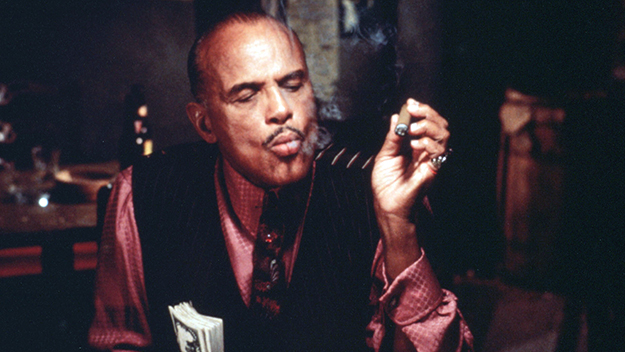Film Comment Recommends: Kansas City
This article appeared in the May 11, 2023 edition of The Film Comment Letter, our free weekly newsletter featuring original film criticism and writing. Sign up for the Letter here.

Kansas City (Robert Altman, 1996)
Harry Belafonte, who died last month at 96, devoted so much time and energy to activism—from helping fund the 1961 Freedom Rides to serving as UNICEF goodwill ambassador—that he suspected his peers considered him self-righteous. “In California, I walked into a place and somebody said, ‘Here comes Mr. Conscience,’ and all the cocaine left the room,” he once explained. Thus, his turn as the elegant but ruthless, coke-snorting 1930s racketeer Seldom Seen in Robert Altman’s jazz riff Kansas City (1996) stands among the most bracing image inversions in screen history.
As in so many Altman works, the plot of Kansas City is a clothesline for environmental and sociological insights. It concerns the efforts of a desperate woman (a committed but grating Jennifer Jason Leigh) to rescue her hapless husband from the clutches of the kingpin he robbed (Belafonte). She kidnaps a politician’s dope-addled wife (Miranda Richardson, poignant in her haziness) and pressures the politico to secure her man’s release, meanwhile forming a provisional alliance with her captive. The Great Depression is at its nadir, and the movies have just learned to talk, but the nascent medium has already sculpted the personas of Leigh’s Jean Harlow–obsessed firecracker and her wannabe-gunsel husband who wears blackface to holdups, both naïve enough to expect Hollywood endings to their half-baked intrigues. Voter fraud provides quick cash to the jobless and destitute, while hot-jazz performances (shot concert-style and integrated thrillingly) supplement the goings-on at Seldom’s Hey Hey Club, the nucleus of the city’s Black underworld.
“Seldom Seen, but often heard,” as Belafonte’s crime czar is described by an admirer, holds court with weary but uninfringeable authority. Crafting most of his own dialogue, Belafonte develops the character through spellbinding soliloquies that reveal a complex man—intuitive, profane, well-informed, and cynical to his marrow. It’s no surprise that his raspy but melodious voice is his greatest asset. In one unforgettable sequence, Seldom tells a joke about back-to-Africa proponent Marcus Garvey while a Black henchman is brutally murdered yards away and left to feed the feral dogs on the premises. Debonair charm and staggering cruelty meld in a solo performance to rival any Belafonte gave in a concert hall—a radical redefinition in which the familiar figure of “Mr. Conscience” is seldom, if ever, seen.
Steven Mears is the copy editor for Film Comment Magazine and Field of Vision’s online journal Field Notes, as well as a frequent contributor to Film Comment, Metrograph’s Journal, Bloodvine, and other publications.







